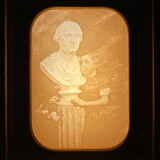The United States has 566 federally recognized Indian tribes that have a common history, common government relations and a common bond.
“I’m intrigued by the idea of going to a different country on the other side of the world that has an indigenous community I have no ties to,” said Nebraska Wesleyan University junior Angel Geller, a member of the Omaha tribe.
Geller will get that chance to study and learn on the other side of the world thanks to a Benjamin A. Gilman International Scholarship that will send her to New Zealand for the spring semester.
An art major and peace and justice minor from Lincoln, Neb., Geller will attend the University of Waikato to strengthen her artistic skills in preparation for graduate school. The international experience will also give her an opportunity that has piqued her interest for a long time — immersing herself in a different indigenous culture.
Geller plans to document here experiences in a self-published magazine comprised of illustrations, photographs, poems and short stories reflecting her experience as an UmonHon woman immersed in a different culture with Maori people of New Zealand. She’ll address topics including tribal politics, gender role traditions, spirituality, contemporary studio artists, alcohol recovery, identity, and more.
“I didn’t choose this host site because it would be easy or convenient,” Geller said of choosing New Zealand. “I understand that I absolutely would be an outsider looking in.”
Before transferring to NWU in 2016, Geller attended Southeast Community College, worked at the Nebraska Commission for Indian Affairs, and was a camp counselor at Sovereign Native Leadership Camp. That particular experience inspired her to take a part-time job that took her on a two-hour drive each Thursday from Lincoln to the UmonHon reservation and back again to work with students on coping skills vital for surviving extreme poverty.
“That one-year commitment unveiled to me that hard work, showing up when I say I’m going to show up, and passion for art can help others see the good in the world,” she said.
Next fall Geller will intern for curator Risa Puleo at the Bemis Center for Contemporary Art in Omaha. Puleo’s winter exhibition will feature Native artists from the Midwest.
The Gilman Scholarship is a nationally competitive program that assists students with study abroad expenses. The program aims to diversify the students who study and intern abroad and the countries and regions where they go. The scholarship is sponsored by the U.S. Department of State’s Bureau of Educational and Cultural Affairs.
Geller is Nebraska Wesleyan’s 47th Gilman Scholarship recipient.













